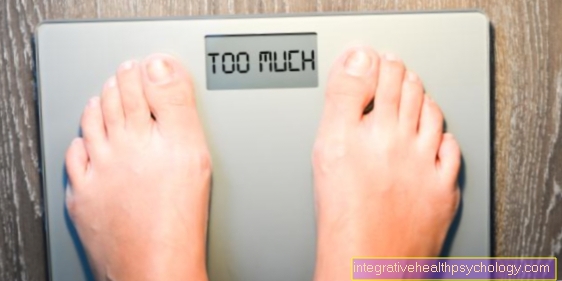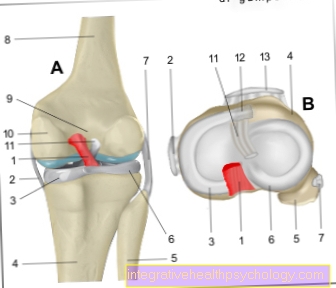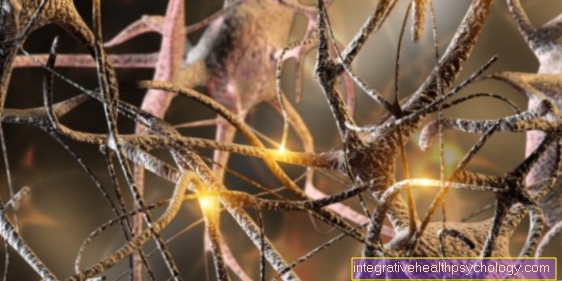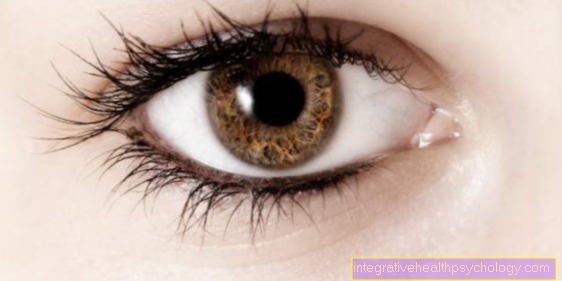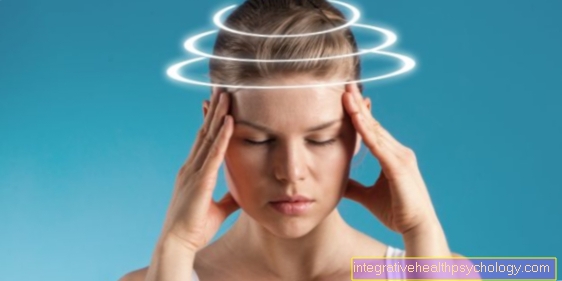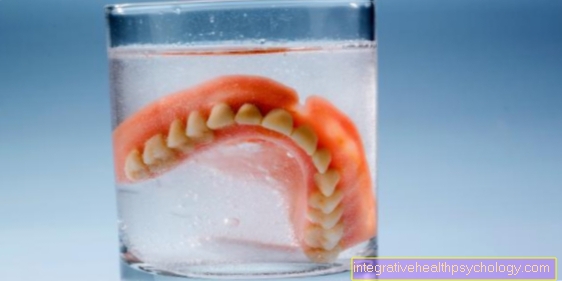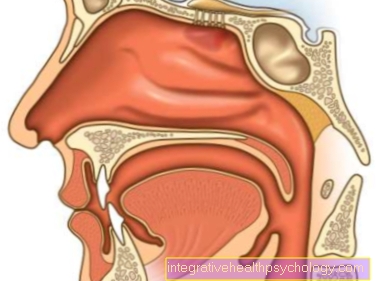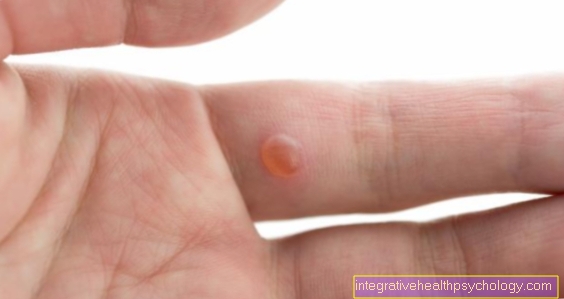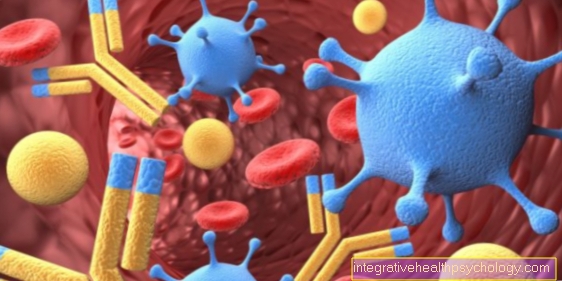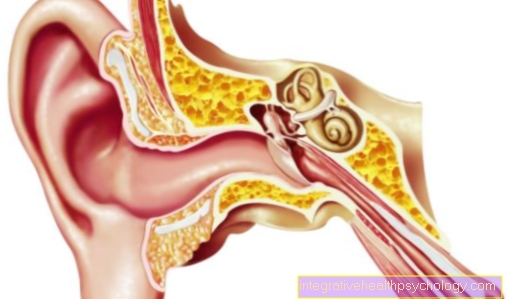Muscle twitching
introduction
Muscle twitching means a sudden contraction (contraction) of the muscles that occurs without conscious control (involuntarily). In technical terminology, this is called myoclonia. All muscle groups in the body can be affected. Frequent twitching of the legs when falling asleep or twitching of the eye muscles.
How strong the muscle twitch is can be very different. The causes of muscle twitching are also diverse. In most cases, however, the cause is harmless. In rare cases, however, serious, mostly neurological, diseases can also be behind it.
Read about muscle twitching all over your body here
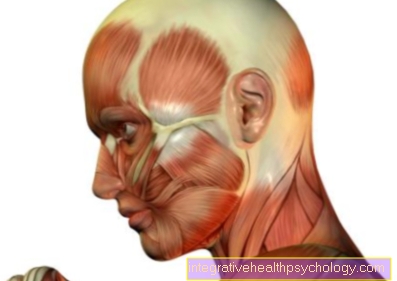
Causes of the muscle twitching
When the muscles twitch, there is an unconscious controllable contraction of the muscles. This can occur on any muscle group in the body. The reasons for this are very diverse.
First of all, you should know that in the vast majority of cases, muscle twitching is not dangerous. Muscle twitching before going to sleep is mostly harmless. However, if the muscle twitching persists, you should consult a doctor.
In addition to psychological causes such as emotional stress or stress, a lack of magnesium can also cause muscle twitching.
Certain drugs can also cause muscle twitching as side effects. Of course, muscle twitching is also possible after consuming alcohol or drugs. Sometimes bacterial infections or viral diseases also play a role.
Likewise, hypoglycemia can also trigger muscle twitching. When muscle twitches, however, one always has to think of neurological diseases such as tics or Tourette's syndrome. Epilepsy can also make itself felt as muscle twitching. This also applies to diseases such as multiple sclerosis or Parkinson's disease. Even in diabetics, the damage to the nerves in the context of polyneuropathy can lead to muscle twitching. Last but not least, the cause of muscle twitching is found directly in the brain, e.g. if you have a brain tumor or encephalitis. (Also read here: Inflammation in the brain)
Nevertheless, it should be noted that muscle twitching is in most cases absolutely harmless. However, it makes sense to see a doctor in order to rule out threatening diseases.
Can it be an indication of epilepsy?
Although muscle twitching is usually harmless, it can actually be an indication of epilepsy. In epilepsy, due to a functional disorder in the brain, pathological excitation spreads repeatedly in certain nerve cell areas of the CNS. This incorrect excitation of certain regions in the brain leads to uncontrollable muscle twitching. These are usually the classic leading symptom for epilepsy. One then speaks of an epileptic fit or seizure.
In addition to a generalized seizure, a distinction is made between focal seizures. Here the pathological spread of excitation is limited to a smaller area in the brain. A partial seizure often involves only one muscle group, e.g. affected on the face or only on the hand.
Read more on this topic at: Epileptical attack
Can it be a reference to MS?
Multiple sclerosis can also make itself felt as muscle twitching. However, these usually occur in the late stages of the disease.
In multiple sclerosis, the myelin sheaths of the nerve fibers are destroyed as part of an autoimmune disease. However, an intact myelin sheath is a prerequisite for the transmission of excitation. This leads to neurological failure symptoms.
The typical symptoms at diagnosis are visual disturbances, as the optic nerve is usually affected. But sensory disturbances and paralysis can also occur. Muscle twitching is not typical of the early-stage disease.
Find out more about this topic at: Diagnosis of multiple sclerosis
Muscle twitching from stress
If there is an uncontrollable twitching of the muscles, this is initially frightening for the vast majority of those affected. However, the causes are often harmless. Twitching of the eyelid, in particular, is often related to stress.
Emotional stress, such as anger at work or in a relationship, can trigger involuntary muscle contractions. This can be explained by the fact that the balance between excitatory and inhibitory impulses in the central nervous system is often not completely intact during stress or psychological stress. If this difficult control is not correct, stimulating impulses sometimes predominate and lead to muscle contraction. However, the symptoms usually regress over time.
For more information, see: Symptoms of stress
Muscle twitching from exercise
Muscle twitching can also occur in healthy people and is usually classified as harmless. Muscle twitching in the extremities is not uncommon after exercise, especially after an intensive training session. Most of the time, muscle twitching after exercise indicates overtraining. In general, this has no disease value. However, it can also be due to a lack of magnesium or calcium, because the body loses water and blood salts (electrolytes) with sweat.
Muscle twitching due to Hashimoto's thyroiditis
Hashimoto's thyroiditis is a chronic autoimmune disease of the thyroid gland that can lead to an underactive thyroid gland (hypothyroidism). The symptoms of the disease can be very diverse. Mostly, however, chronic fatigue and listlessness are in the foreground.
Weight gain, frequent freezing, hair loss and digestive problems are also reported more frequently. Sometimes a short period of overactive thyroid gland (hyperthyroidism) occurs at the beginning of the disease. Palpitations, high blood pressure, increased sweating and inner restlessness are characteristic of this time. Muscle twitching can also occur at this stage of the disease. In principle, however, it should be noted that muscle twitching is not a classic symptom of Hashimoto's disease.
Muscle twitching after a herniated disc
In the case of a herniated disc, the inner gelatinous core breaks through the outer fibrous ring of the intervertebral disc and can thus press on neighboring neural structures. The symptoms are varied and depend on where the herniated disc occurred, how large it is and which nerves or nerve roots are irritated by it. Sometimes there is just a muscle twitch.
In other cases the patient complains of a tingling sensation on the skin (sensory disturbance). In severe cases, the affected muscles can even be paralyzed.
Read more about this at: How long does a herniated disc last?
Can muscle twitching also be psychosomatic?
A muscle twitch can also be psychosomatic. Although medical laypeople often associate the term psychosomatic illness with the patient imagining the symptoms, this is not the case. In the medical field it is assumed that there is a very close connection between body (Soma) and soul (Psycho).
Permanent emotional stress such as professional or private conflict situations can manifest themselves in the form of physical illnesses. Despite intensive diagnostics, the doctor cannot find a purely organic cause. Ultimately, it is believed that stress is responsible.
This can be better understood if one considers that stress or psychological stress often leads to an imbalance of stimulating and inhibiting impulses in the central nervous system. On the one hand, this can lead to muscle twitching. On the other hand, the vegetative nervous system also influences the internal organs. Therefore, disorders of the gastrointestinal tract or the cardiovascular system can also occur.
For more information, see: Symptoms of stress
Can you prevent muscle twitching?
Muscle twitching involves the involuntary contraction of a muscle due to a faulty impulse from the associated nerve. This can have numerous triggers. Often the cause is stress or emotional stress. Therefore, one can safely counteract this symptom through ways of coping with stress.
In addition, a sufficient supply of magnesium ensures that no muscle twitching occurs due to a magnesium deficiency. If a tic disorder or another neurological disorder is the cause of the muscle twitching, the corresponding disease must be treated in order to prevent the muscle twitching as much as possible.
How long does the muscle twitch last?
Depending on the trigger, the spontaneous muscle twitching is usually short-lived. Since the most common triggers are stress or psychological distress, the symptoms disappear quickly.
Magnesium deficiency, another cause of muscle twitching, usually only lasts for a short period of time. Ultimately, it can of course be that the muscle twitching occurs again and again and then disappears again. However, if you notice an involuntary twitching of the muscles for weeks, a doctor's visit is strongly recommended.
Muscle twitching during pregnancy
During pregnancy, most women are very sensitive to changes in their bodies. Involuntary twitching of the muscles is also perceived and causes fear. Most of the time, however, the cause of muscle twitching during pregnancy is harmless.
Often a magnesium deficiency is behind it. There is an increased need for magnesium during pregnancy. You should therefore first increase your magnesium intake as part of your diet. Magnesium tablets can, however, also be useful. If the symptoms do not improve, you should definitely talk to a doctor about it.
How is muscle twitching diagnosed?
In order to determine the cause of the muscle twitching, a detailed medical history (anamnesis) is necessary. The doctor will therefore ask which muscle groups are affected, how often the twitches occur and how pronounced they are.
Usually, based on the anamnesis, one already has a suspected diagnosis. This is followed by a physical examination. If the doctor deems it necessary, further tests such as measuring nerve conduction velocity (ENG) or measuring electrical muscle activity (EMG) can be carried out.
Muscle twitching according to localization
Muscle twitching in the upper arm
When muscles twitch in the upper arm, there is an uncontrollable contraction of one upper arm muscle or muscle group. Muscle twitching in the extremities is common and in most cases is without disease.
Muscle twitching on the upper arm can also occur in healthy people. Usually the muscle twitching on the upper arm can only be recognized by a short movement of the skin. It is rather rare that the arm moves unintentionally from its resting position.
Ultimately, various factors can trigger muscle twitching in the upper arm. Often overstrained by too intense strength training of the arms or a magnesium deficiency are responsible. Tension or cramps in the muscles due to poor posture can also lead to this.
It therefore makes sense to take care of your arm first and replenish the body's magnesium stores. Then the muscle twitching usually disappears.
If this is not the case, it is time to see a doctor, as serious diseases can always hide behind the muscle twitching of the upper arm. This is also the case if other symptoms such as pain, sensory disturbances or paralysis are added.
Read more on the subject at: Muscle twitching in the upper arm
Muscle twitching all over your body
Contraction of the muscles, which cannot be controlled arbitrarily, can affect all muscle groups in the body and therefore also occur throughout the body. Arms and legs as well as the face and stomach can be affected.
Depending on the severity, there is only a small visible movement of the skin. With stronger muscle twitching, there is sometimes a corresponding movement of the affected extremity or the eye. This can be extremely stressful for the affected patient. Most of the time, this muscle tremor does not mean a serious illness. The cause is often harmless and mostly temporary. Stress and psychological stress often play a role.
In rare cases, however, the twitching of muscles all over the body may indicate a serious neurological condition (such as amyotrophic lateral sclerosis (ALS) or multiple sclerosis (MS)). Therefore, it is advisable to consult a doctor if the muscle twitching increases.
Muscle twitching in the calf
Muscle twitching in the calf causes involuntary movement of the calf muscles. Some patients also experience this muscle twitch as a leg cramp. The causes for this are mostly harmless. The symptoms usually go away on their own.
However, serious illnesses can also be concealed behind the muscle twitching. On the one hand, this can be a nerve disease such as polyneuropathy. Several (poly) nerves are affected here. The motor response of the muscle fiber is impaired by the nerve damage.
This is also the case with amyotrophic lateral sclerosis (ALS) or multiple sclerosis (MS). However, herniated discs or narrowing in the spinal canal can also damage nerves in the spinal cord area. This can cause muscle twitching in the calf area.
In addition to these muscle twitches, there are often symptoms such as back pain, sensory disturbances or, in the worst case, even paralysis. The most common cause of muscle twitching in the calf, however, is a disturbed mineral balance. The blood salts (electrolytes) such as sodium, potassium, calcium and magnesium play an important role here. A lack of magnesium in particular leads to muscle twitching in the calf. You should therefore consume magnesium in case of muscle twitching in the calf.
Further information on this topic can be found at: Muscle twitching in the calf
Muscle twitching in the eye
When the eyes twitch there is an uncontrollable movement of the eye muscles, usually in the form of the eyelid twitch. This is a very common phenomenon, and although the cause is usually harmless, most people suffer from severe suffering. Involuntary muscle twitches can occur all over the body. In the eye, however, the muscles are located directly under the skin, which is why muscle twitching in the eye is perceived as particularly annoying.
In addition to stress, fatigue and a lack of magnesium, other possible causes are eye diseases and diseases of the central nervous system. Therefore, if your eyes twitch you should first consult an ophthalmologist. This rules out an eye infection. He can also check whether there is any visual impairment. Defective vision can lead to overexertion of the eye and thus trigger an eyelid twitch.
If there is a need for further clarification, it is also useful to see a neurologist. This examines whether there is a disease of the central nervous system such as amyotrophic lateral sclerosis (ALS), multiple sclerosis (MS), epilepsy or a brain tumor. However, these causes of muscle twitching in the eye are really rare.
Read more on this topic at: Eye twitching - what are the causes?
Muscle twitching in the legs
An involuntary contraction of the muscles can in principle occur all over the body. However, such muscle twitches are particularly common in the extremities and especially in the legs. These can be differently pronounced.
Sometimes the muscle twitching is only perceived as a fine movement under the skin. This is called fasciculations in technical terms.
However, there are also cases in which the leg moves out of its resting position. This is mostly harmless, especially if it occurs shortly before falling asleep. However, there can always be restless legs syndrome (syndrome of restless legs) behind it. In this neurological disease, patients also complain of unpleasant sensations (tingling) in the legs and a pronounced urge to move.
The causes of this disease have not yet been conclusively researched. However, similar to Parkinson's disease, it is assumed that the dopamine metabolism in the brain is impaired. It is possible to try drug treatment. Here, too, the neurologist would be the right contact.
You will find more information on this topic here: Twitching in the leg
Muscle twitching in the abdomen
A muscle twitch on the trunk, e.g. on the stomach, is rather rare. Here, too, the focus is mostly on harmless causes. The muscle twitching in the stomach is most likely triggered by stress and psychological stress. But magnesium deficiency can also lead to these symptoms.
Therefore, muscle twitching in the abdomen often occurs after exercise or during pregnancy when there is an increased need for magnesium. Therefore, if you experience muscle twitching in your stomach, you should first take magnesium. Most of the time, the symptoms also improve.
If this is not the case, it makes sense to consult a doctor. After a detailed medical history (anamnesis) and a physical examination, the doctor will initiate further neurological examinations such as EMG (electromyography) or ENG (electroneurography) as well as sectional imaging (CT, MRT) or an examination of the nerve fluid (liquor analysis).
Read more on this topic at: Twitching in the abdomen
Muscle twitching in the upper arm
Muscle twitching is particularly common in the upper arm. The muscle cells are activated by a malfunction of the nervous system without being able to deliberately influence it. These twitches usually go away after a short time.
Psychological stress and stress are often the cause. Fatigue or excessive strain after too intense strength training can also be responsible for the muscle twitching. Ultimately, there is often a magnesium deficiency. However, this disturbance in the electrolyte balance can easily be remedied by increasing the intake of magnesium. Especially in phases of increased magnesium consumption, whether during pregnancy or after exercise, you should take magnesium (e.g. in tablet form).
However, if there are other symptoms, such as pain or sensory disorders, you should urgently consult a doctor. Then there can be a serious illness behind it. The muscle twitching in the upper arm can then indicate that the corresponding nerve is narrowed by a herniated disc in the neck area. Neurological diseases are also conceivable. However, the causes of muscle twitching in the upper arm are usually harmless.
Twitching of muscles in the face
If muscle twitching occurs in the face, most patients find them extremely annoying. This is because the skin on the face is particularly thin. Therefore, even discrete muscle twitches are well perceived. Especially when the twitching occurs in the area of the eyes and leads to a twitching of the eyelid, the patient is suffering from high levels of suffering.
Again, the muscle twitches usually go away on their own. Magnesium can be taken to prevent a possible magnesium deficiency.
In addition to emotional strain and stress, twitching muscles in the face can also be an indication of a tic disorder. A distinction is made between motor and vocal tics.
Motor tics are involuntary repeated contractions of individual muscles or muscle groups. This condition is more common in children and adolescents than in adults. The disease can be treated with psychotherapy or medication. In most cases, an atypical neuroleptic is used when the disease progresses. The contact person for diagnosis and therapy of the disease is the neurologist.
Further information on this topic can be found at: Twitching of the face, twitching of the eyebrows - is that dangerous?
Muscle twitching in the knee
A muscle twitch in the knee is often harmless. Magnesium deficiency or overwork after excessive strength training are common causes. Then the twitching of the knee should improve after a few days.
However, it is also possible that a pinched nerve is responsible for the muscle twitching. But then there are usually other symptoms such as pain or sensory disorders. In this case one should consult a doctor.
It can also be an orthopedic problem. Sometimes bulging disc tissue presses on a nerve root near the spinal cord.
One can also think of neurological diseases such as amyotrophic lateral sclerosis (ALS) or multiple sclerosis (MS). In most cases, however, muscle twitching in the knee is completely harmless and will go away on its own.
Muscle twitching of the thumb
Muscle twitching in the hand usually results in minimal movement of the thumb. This usually has no disease value, but is perceived by the patients as extremely annoying.
Stress and emotional strain are often the trigger for the complaints. However, these usually disappear on their own. If this is not the case, you should consult a doctor.
Read more on this topic at: Twitching of the thumb
Muscle twitching of the eyelid
A twitching eyelid is popularly referred to as a "nervous eye". A short-term nerve disorder activates the muscles in the eye and contracts. This is not subject to voluntary control at this moment.
As the term "nervous eye" suggests, stress and emotional strain are often the trigger for this. The eyelid twitching therefore usually improves on its own after a while. Even if it is not bad, many patients find it absolutely annoying. If the muscle twitching of the eyelid persists, a neurologist should therefore be consulted, as a neurological disease, e.g. a tic disorder could be behind it.
Further information on this topic can be found at:
- Eyelid twitching
- What can be causing eye twitching?
Muscle twitching of the lip
The muscles on the lip can also be activated by a faulty nerve impulse and muscle twitching occurs on the lip. In most cases, the cause of this is absolutely harmless. Often there is stress or psychological stress factors behind it. The twitching therefore usually improves on its own in the course of the process.
Accompanying symptoms of muscle twitching
The sudden twitching of a muscle or a muscle group cannot be controlled and is caused by a malfunction of the associated nerve.
Usually stress or emotional stress is the cause. However, nerve irritation from a herniated disc can always be the cause. In this case, pain and sensory disturbances also appear as accompanying symptoms. In the worst case, the affected muscle can even be paralyzed.
Even with epilepsy, only muscle twitching can initially occur. In the case of a partial seizure, only a small area of the brain is affected by the disorder and there is usually no impairment of consciousness.In a generalized seizure, both hemispheres of the brain can be completely affected, which in addition to muscle twitching, leads to unconsciousness. Most seizures only last a few minutes and then stop on their own.
Muscle twitching can also play a role in other neurological diseases such as amyotrophic lateral sclerosis (ALS). However, there are also other accompanying symptoms. Most of the time, patients complain of impaired fine motor skills and unsteady gait.
Basically, one can say that muscle twitching without accompanying symptoms is rather harmless. However, if accompanying symptoms occur, you should urgently consult a doctor.
Muscle twitching and pain
An involuntary muscle twitch occurs when the nerve that activates the muscle is irritated. This can be the case, for example, due to an intervertebral disc damage in the area of the nerve root. The leaking disc tissue presses on the nerve. This usually leads to massive pain.
Stress and emotional distress are often the cause of muscle twitching. In these cases, however, there is no accompanying symptom pain. So if pain occurs in addition to muscle twitching, this can be an indication of a serious illness such as a herniated disc.
Muscle twitching and tingling
When the muscle twitches, an irritated nerve activates the muscle, which then involuntarily contracts. Tingling is a very typical accompanying symptom, as many patients perceive nerve irritation as tingling.
Most of the time, there is a tingling sensation with a discreet nerve stimulation. If the nerve is damaged for a long time, pain occurs. You know this from a hand that has fallen asleep, for example. So there is nothing to worry about. If the tingling and muscle twitching do not go away on their own, you should consult a doctor.
Treatment of muscle twitching
The treatment of involuntary muscle twitches depends on the cause. Most of the time, stress or emotional distress is the trigger for the muscle twitching. Therefore, the muscle twitching usually disappears on its own without treatment. It also helps to learn ways of coping with stress, such as autogenic training.
Behavioral therapy can also be useful to deal with emotionally stressful things.
If a magnesium deficiency is the cause of the muscle twitching, one should first try to increase the magnesium intake in food. Magnesium can also be supplied in tablet or powder form. Here, too, the muscle twitching usually improves after a short time.
If the muscle twitching is caused by serious illnesses, these must be treated. Usually the neurologist is the first point of contact. If there is a suspicion of a herniated disc, it makes sense to see an orthopedic surgeon. Basically, however, the muscle twitching disappears by itself in the vast majority of cases even without therapy.
Magnesium for muscle twitching
In addition to stress and psychological stress factors, a magnesium deficiency is a common trigger for muscle twitching. Especially for people with an increased need for magnesium, e.g. in athletes or during pregnancy, magnesium deficiency can occur.
In these cases one should try to increase the magnesium intake in the diet first. Legumes such as beans, chickpeas and lentils are rich in magnesium. This also applies to sesame, pumpkin seeds or poppy seeds. Last but not least, bananas also contain a lot of magnesium. In addition, you can always take magnesium in the form of dietary supplements as tablets or in powder form.
The benefit has not been clearly proven, but you can definitely give it a try.
Limptar for muscle twitching
Limptar is a well-known drug that is used for muscle spasms or twitching. In the meantime, however, the drug is no longer available for sale in the pharmacy, but has to be prescribed on a prescription.
The reason is that in the past there have been serious side effects such as cardiac arrhythmias, changes in the blood count as well as visual and hearing disorders.
The drug contains the active ingredient quinine. This relaxes the muscles. However, due to the side effect profile, it should only be taken after consulting a doctor.
Muscle twitching before going to sleep
Muscle twitching before going to sleep is very common. About 70 percent of the population are affected. The muscle twitching usually occurs in the phase immediately before going to sleep. How exactly this happens has ultimately not been fully researched.
The theory, however, is that the brain is about to go into sleep mode. However, this sometimes happens a little disorderly for uncertain reasons. The balance between excitatory and inhibitory impulses is disturbed, so that short-term electrical impulses are transmitted to individual muscles, which then contract (contract). However, this phenomenon is harmless and occurs occasionally in healthy people.
Read more about this: Muscle twitching when falling asleep- is that dangerous?
Can muscle twitching also be a sign of pregnancy?
Muscle twitching alone is not a classic sign of pregnancy. However, during pregnancy the increased magnesium requirement can lead to a magnesium deficiency. This promotes muscle twitching.
If the typical signs of pregnancy such as missed periods, morning sickness, swollen breasts and a changed sense of smell or taste appear, pregnancy is very likely. You can then get more certainty through a pregnancy test.

